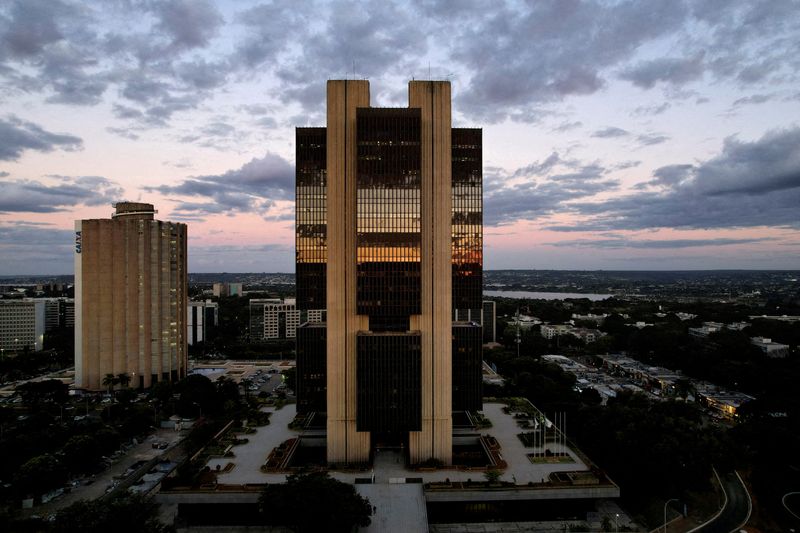By Marcela Ayres and Bernardo Caram
BRASILIA (Reuters) - Brazil's government is preparing to cooperate more closely with the central bank on regulatory issues like cryptocurrencies and meal vouchers next year when the bank gets new leadership, following occasional differences over policy on such matters.
Incoming central bank chief Gabriel Galipolo, whose term starts in January following his appointment by President Luiz Inacio Lula da Silva, has delivered a hawkish message on monetary policy, showing he is not shy about hiking interest rates despite Lula's repeated demands for lower borrowing costs.
However, the two are likely to find more common ground on regulatory matters, where the central bank has sometimes been at loggerheads with the Finance Ministry in recent years.
Three Finance Ministry officials described on condition of anonymity a series of frustrated discussions with the central bank on matters ranging from regulation of crypto assets to allowing global trading platforms to list Brazilian public debt.
Two of the ministry sources said collaboration had suffered as the central bank became more withdrawn from policy discussions since gaining formal autonomy under a 2021 law.
"The central bank confused autonomy with the idea that it wasn't a government body and couldn't have a joint agenda with the Finance Ministry. That should change," said one ministry source.
That law also staggered the terms of the central bank president to straddle national elections, so central bank chief Roberto Campos Neto, appointed by right-wing ex-President Jair Bolsonaro, has served for the first two years of Lula's term.
While berating Campos Neto publicly over high interest rates, Lula has called his successor Galipolo a "golden boy."
The Finance Ministry and the central bank did not respond to requests for comment.
The ministry sources expressed hopes for more collaboration with Galipolo in charge. A central bank source said improved cooperation would reset the "tone" of the relationship.
"I really hope we'll have more integration on issues that don't affect the central bank's core (inflation) mandate," said another ministry source. "I'm not saying we want a seat on the Monetary Policy Committee - that's not it."
IMPASSES
One official pointed to concerns about crypto asset regulation, which is being handled by the central bank without coordination with the government. That has complicated Finance Ministry policy on regulating online gambling, since many sites are operating with cryptocurrencies, the source said.
The central bank said earlier this year it expected to finalize its proposed crypto regulations by the end of the year.
On another front, the government plans to resolve a long-standing impasse over new regulations to open up competition in the 150 billion reais ($26.5 billion) meal voucher market.
For years, tech companies including Mercado Libre have been looking to take a bigger bite of the market dominated by companies such as Sodexo (EPA:EXHO) and Edenred (EPA:EDEN) for meal cards that firms must provide for full-time workers.
Although legislation passed in 2022 should allow workers to transfer the balance of their meal cards between providers and use them at any participating restaurants, it remains unclear which regulator will issue and oversee the new rules.
The Finance Ministry sees the central bank as the natural regulator for the payment system. But the bank has resisted taking on the responsibility, citing a lack of staff and resources to regulate a market that serves 22 million workers while posing no systemic risk, according to sources.
During a meeting with industry groups last month, Finance Minister Fernando Haddad suggested the regulations would be in place by early next year, according to one attendee. However, the issue remains unresolved within the central bank, said one source from the institution.
The Finance Ministry has also failed to advance discussions with the central bank on a plan to allow Treasury bonds to be traded directly on the Belgium-based Euroclear platform, a plan the government unveiled in 2023. Today that trading is done only on a local platform.
Trading on Euroclear would simplify access for foreign investors to Brazilian debt, but it is being blocked by "bureaucratic" resistance and "corporate interests" from the central bank, said one ministry source.
The bank has argued that it needs real-time control over information regarding debt issuance and holders to monitor and prevent money laundering, added the source.

The central bank and Finance Ministry did not respond to questions about cryptocurrency and meal voucher regulations or allowing public debt securities on the Euroclear platform.
($1 = 5.6588 reais)